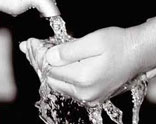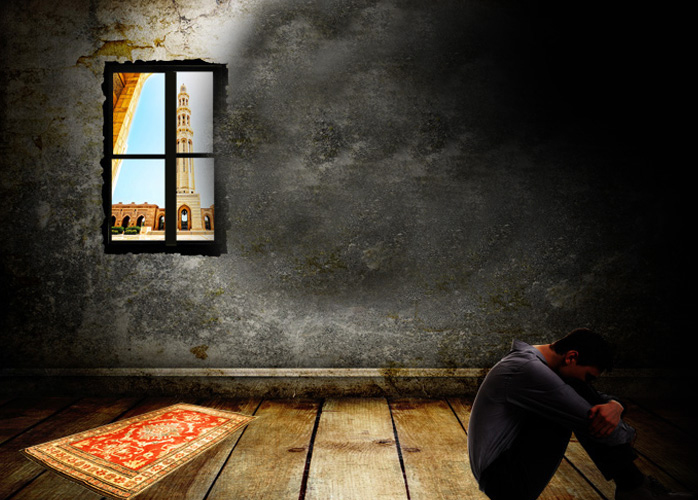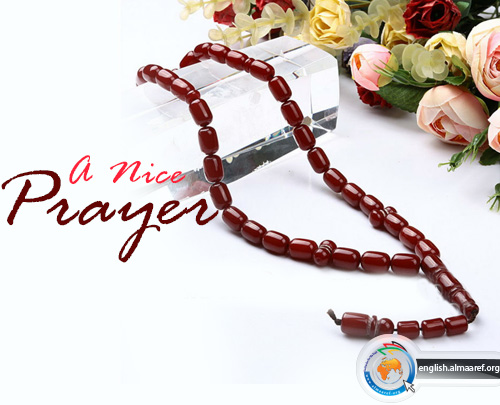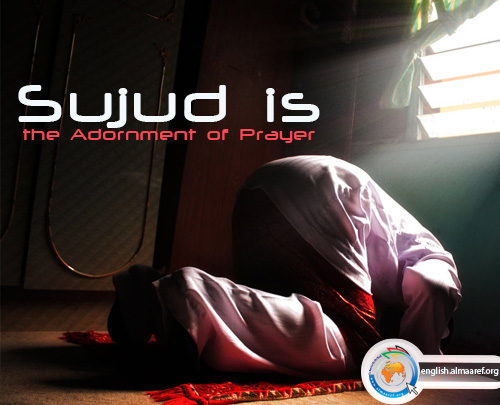The Most High God says,
﴾O ye who believe! When ye prepare for prayer, wash your face and your
hands (and arms) to the elbows; rub your heads (with water); and (wash) your
feet to the ankles!﴿1
It is related in the noble discourse, “He who gets into ritual impurity and then
does not perform ablution, then he has turned away from me.”2
The Duties of Ablution
During the performance of ablution, the religiously responsible person must
perform two deeds:
First: washing the face and the hands
Second: wiping the head and the feet3
Each deed has certain limits which must be taken into consideration. As regards
the face, it must be washed from the start of the line of the hair till the end
of the chin in length and what can be reached by the thumb and the middle finger
in width. It is a dutiful cautiousness to include what remains from the face in
width.4
As regards the hands, the right and the left hands must be washed from the elbow
to the tips of the fingers. The standard for the correctness of the washing is
to make the water reach the whole of the organ even if by wiping it with the
hand; yet it is not enough to wipe the organ with the wet hand only.
As regards the head, one must wipe its front.
As regards the feet, one must wipe them from the tips of the finger nails till
the joint of the foot.5
- There is no problem with pouring two or more downpours of water on the face or
the hands, yet it is impermissible to wash them more than twice.6
- It is incorrect to wipe the peruke unless in case lifting it results in
unbearable embarrassment and hardship; then it is permissible to wipe it.7
- It is incorrect to wipe the socks instead of the feet however transparent they
are.8
- In case taking off the shoes in order to wipe the feet is too difficult and
embarrassing for the religiously responsible person (like the handicapped), then
wiping them is permissible and correct as well.9
- The least wiping of the head and the feet is by one finger in width even
though it is a desirable cautiousness to wipe them by three fingers.10
- In case the religiously responsible person does not have a palm, he can wipe
with his arm. In case he does not have an arm, he can take the wetness from his
face and wipe his head and feet.11
- It is not dutiful to wipe the skin of the head; it is enough to wipe the front
of the hair of the head.12
The Conditions of the Correctness of Ablution
A- The Conditions Related to the One Performing Ablution
1- Intention
Intention means to mean to perform the deed in order to get close to The Most
High God. Had the religiously responsible person performed ablution while being
negligent of what he is doing, then his deed would not have been correct. It is
not conditional to utter the intention. As it is dutiful in the beginning of the
deed, it must remain till its end.13
It is religiously permissible to perform ablution with the intention of being at
purity. Moreover, it is permissible to perform the prayer with the desirable
ablution.14
In case one performs ablution, before it is time of the noon prayer, with the
intention of the noon prayer, then his ablution and prayer will be correct.15
2- No Screen on the Organs of the Ablution
- From the conditions is to have no screen on the organs of ablution. By the
screen, it is meant anything on the body which prevents water from reaching it.
- The fats which are normally secreted by the body on the hair and the skin are
not considered to be a screen unless they are much to an extent that the
religiously responsible person regards them to be preventive of the water to
reach the skin and the hair.16
- In case the tattoo on the body is just color and thus does not prevent the
water from reaching the skin, then the ablution is considered to be correct.
Likewise is the case if the tattoo is in the bottom of the skin.17
In case the ink prevents the water from reaching the skin, then it is considered
to be screen. And the issue of diagnosing these points is in the hand of the
religiously responsible person.18
- In case the artificial dye which women or men use in coloring the hair of the
head or eyebrows or chin does not prevent the water from reaching the skin; and
in case it is just color, the ablution is considered to be correct.19
3- The Organs to be Wiped Must Be Dry and Pure
From the conditions also is that the organs to be wiped (the head and the feet)
must be pure and dry i.e. with no transmitting wetness on them.
The spot to be wiped must be dried even from the drops, so that the influence
will not be from the wiping to the wiped and not the vice versa.20
B- The Conditions Related to the Water of Ablution
1- Purity
In case the religiously responsible person performs ablution with an impure
water, his ablution is considered to be incorrect with no difference whether the
case is that of intention, ignorance, or forgetfulness.21
In case the religiously responsible person realizes that his ablution is wrong
after having performed certain worships with this ablution, then he has to
repeat these worships.22
2- The Completeness of Water
Performing ablution with the added to water abolishes the ablution whether the
ablution is performed ignorantly or forgetfully with respect to the fact that
the water is added to.23
3- The Permissibility of Water
In case one performs ablution with usurped water i.e. with water which he is not
permitted to dispose of:
- His ablution is considered to be correct in case he is ignorant of the
usurpation of the water.
- His ablution is also considered to be correct in case he forgets about the
usurpation of the water under the condition that he is not the usurper himself.
- His ablution is considered to be incorrect in case he is the usurper himself
whether he knows or is ignorant of the usurpation of the water.
C- The Conditions Related to the Process of Ablution
1- Arrangement
Arrangement must be taken into consideration in the ablution i.e. washing the
face at first, washing the right hand, washing the left hand, wiping the front
of the head, wiping the right foot with the right hand, and then wiping the left
foot with the left hand.24 It is a dutiful cautiousness to wipe the head with
the right hand.25
2- Succession
It is meant by succession not to delay the wash of the next organ to the extent
that this delay results in the dryness of the previous organs.26
In case one completes his ablution as is customarily yet dryness takes place due
to the intensity of heat and air, then the ablution will not be abolished.27
The ablution is abolished upon breaking the succession even if forgetfully.28
The standard of the correctness of the ablution is either the remaining of the
wetness or the customary succession.29
3- The Direct Performance
The religiously responsible person must by himself perform the acts of ablution,
and it is incorrect that somebody else performs the ablution for him in case of
choice and ability of performing it by himself.30
In case one is unable to perform the ablution by himself, it is permissible that
someone else performs ablution for him. Yet as regards wiping the head and the
feet, the assigned person must wipe them with the hand of the unable religiously
responsible person if he can; still, if he can not do this, the assigned person
must wipe them with the wetness of the hand of the religiously responsible
person.31
That someone else pours the water into the hand of the one performing ablution
is not considered to be a breaking of the condition of direct performance. This
does not affect the correctness of the ablution, for the role of the one pouring
the water is just like that of the water taps in the houses.
4- No Inversion
Inversion is not permissible in washing the face and the hands and in wiping the
feet. It is dutiful to wash the face from up to down and the hands from the
elbow to the tips of the finger nails32; and it is dutiful to wipe the feet
from the tips of the finger nails to the joint of the foot.33
As regards the head, inversion in wiping is permissible in spite of that it is a
desirable cautiousness to wipe it from back to the line of the growth of the
hair.34
It is not considered an inversion to pour the water on the organs of washing. In
case the religiously responsible person pours the water in an inversed way yet
washes from up to down, this does not affect the correctness of the ablution.
The Abolishers of the Ablution
The ablution is abolished by any of the following things:
First and Second: the getting out of the urine and the feces
The ablution is abolished when the urine and the feces get out of the ordinary
exit or of any other exit.35
As regards the abolishment of the ablution, there is no difference between the
little and the plenty urine or feces.
Third: the breaking of wind from the back
The ablution is abolished with the breaking of the wind.36
Fourth: whatever results in mindlessness
Everything resulting in mindlessness, such as: insanity and alcoholism and coma
abolishes the ablution whether it is intentional or not.37
Fifth: the sleep which dominates the hearing sense and the seeing sense
In case the hearing sense is absent because of distrait yet the seeing sense is
still active, or in case the seeing sense is absent because of closing the eyes
yet the hearing sense is still active, then the ablution is not abolished.38
Sixth: touching the dead corpse of the human being
The ablution is abolished in case one touches the corpse of the human being
after it has got cold or before it is done with its washing.39
- Touching the corpse of the martyr does not abolish the ablution because the
very corpse of the martyr needs not be washed because it is pure.
Bits and Pieces
- In case one is not sure of ritual impurity yet is doubtful of purity, he must
build on ritual impurity and thus get purified. On the other hand, in case one
is not sure of purity yet is doubtful of ritual impurity, he must build on
purity.40
- In case one is not at ablution, he is forbidden to touch the Term of Majesty
“Alalh” and all the Characteristics and Names of God. Also, it is a dutiful
cautiousness not to touch the names of the prophets and the authorities and the
names of the Impeccable Household and Sayyda Al-Zahraa (God’s prayers and peace
bestowed upon them).41
- The judgment of the pronouns referring to God is not that of the Name of God,
so it is permissible to touch them.42
- The one in ritual impurity is permitted to put on the necklace on which the
Qur’anian verses or the names of the prophets and the Imams (God’s peace
bestowed upon them) are engraved; however, it is impermissible that the
inscription touch the body.43
- In case the Term of Majesty “Allah” is included in the complex names of
certain people, such as: Abdullah, then it is impermissible to touch these names
even without being at purity.44
1- The Noble Qur’an/
Al-Ma’ida [The Table] Chapter/ Verse 6
2- Bihar Al-Anwar [The Seas of Lights]/ Part Seventy Seven/ Page 308
3- Ajweebat Al-Istifta’at [The Answers to the Consultations]/ Part One/ Page 38/
Question 112
4- Tahreer Al-Waseela [Editing the Means]/ Part One/ Page 21/ Question 1
5- Ajweebat Al-Istifta’at/ Part One/ Page 36/ Question 105
6- Ajweebat Al-Istifta’at/ Part One/ Page 35/ Question 102
7- Ajweebat Al-Istifta’at/ Part One/ Page 41/ Question 127
8- Ajweebat Al-Istifta’at/ Part One/ Page 38/ Question 113
9- Ajweebat Al-Istifta’at/ Part One/ Page 40/ Question 119
10- Tahreer Al-Waseela [Editing the Means]/ Part One/ Page 23/ Questions 15 and
12
11- Ajweebat Al-Istifta’at/ Part One/ Page 39/ Question 115
12- Ajweebat Al-Istifta’at/ Part One/ Page 41/ Question 126
13- Tahreer Al-Waseela [Editing the Means]/ Part One/ Pages 28 and 29/ Questions
18 and 19
14- Ajweebat Al-Istifta’at [The Answers to the Consultations]/ Part One/ Page
40/ Question 121
15- Ajweebat Al-Istifta’at/ Part One/ Page 39/ Question 117
16- Ajweebat Al-Istifta’at/ Part One/ Page 35/ Question 103
17- Ajweebat Al-Istifta’at/ Part One/ Page 44/ Question 144
18- Ajweebat Al-Istifta’at [The Answers to the Consultations]/ Part One/ Page
44/ Question 141
19- Ajweebat Al-Istifta’at/ Part One/ Page 44/ Question 140
20- Ajweebat Al-Istifta’at/ Part One/ Page 42/ Question 134
21- Tahreer Al-Waseela [Editing the Means]/ Part One/ Page 26/ Question 6
22- Ajweebat Al-Istifta’at/ Part One/ Page 43/ Question 136
23- Tahreer Al-Waseela/ Part One/ Page 26/ Question 6
24- Tahreer Al-Waseela [Editing the Means]/ Part One/ Page 281/ Question 13
25- Ajweebat Al-Istifta’at [The Answers to the Consultations]/ Part One/ Page
38/ Question 112
26- Ajweebat Al-Istifta’at/ Part One/ Page 41/ Question 128
27- Tahreer Al-Waseela/ Part One/ Page 28/ Question 14
28- Tahreer Al-Waseela/ Part One/ Page 28/ Question 16
29- Tahreer Al-Waseela/ Part One/ Page 28/ Question 15
30- Tahreer Al-Waseela [Editing the Means] /Part One/ Page 27
31- Ajweebat Al-Istifta’at [The Answers to the Consultations]/ Part One/ Page
39/ Question 115
32- Tahreer Al-Waseela/ Part One/ Page 21/ Question 2
33- Ajweebat Al-Istifta’at/ Part One/ Page 37/ Question 110
34- Ajweebat Al-Istifta’at/ Part One/ Page 38/ Question 112
35- Tahreer Al-Waseela [Editing the Means]/ Part One/ Page 30/ Question 1
36- Tahreer Al-Waseela/ Part One/ Page 30/ Question 1
37- Tahreer Al-Waseela/ Part One/ Page 30/ Question 1
38- Tahreer Al-Waseela/ Part One/ Page 30/ Question 1
39- Tahreer Al-Waseela/ Part One/ Page 32/ Question 5
40- Tahreer Al-Waseela/ Part One/ Page 32/ Question 1
41- Tahreer Al-Waseela/ Part One/ Page 32/ Question 1
42- Ajweebat Al-Istifta’at [The Answers to the Consultations]/ Part One/ Page
46/ Question 147
43- Ajweebat Al-Istifta’at/ Part One/ Page 47/ Question 153
44- Ajweebat Al-Istifta’at/ Part One/ Page 47/ Question 152




















